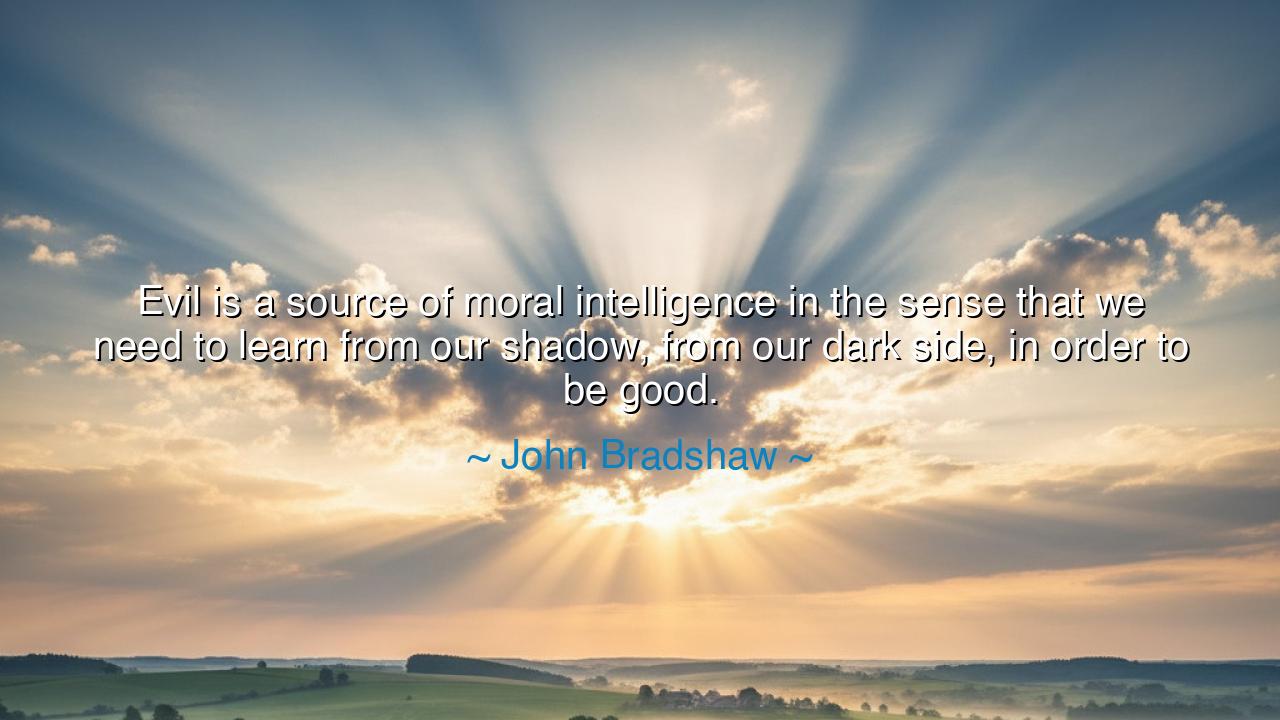
Evil is a source of moral intelligence in the sense that we need
Evil is a source of moral intelligence in the sense that we need to learn from our shadow, from our dark side, in order to be good.






“Evil is a source of moral intelligence in the sense that we need to learn from our shadow, from our dark side, in order to be good.” Thus spoke John Bradshaw, the wise seeker of the soul, unveiling a truth long known to the sages but feared by the faint of heart — that goodness without self-knowledge is fragile, and that to be truly virtuous, one must first gaze upon one’s own darkness without turning away. For the light of wisdom does not arise from the denial of evil, but from the understanding of it, the recognition that within every human heart lies both the seed of creation and the power of destruction.
Since the dawn of time, mankind has wrestled with the duality of its nature. The ancients told of this through myth and legend. The Greeks spoke of Prometheus, who defied the gods to bring fire to mankind — a symbol of knowledge and rebellion, both divine and dangerous. In him we see that even noble intent can birth suffering, and yet that very suffering teaches compassion and restraint. The ancients understood that to reject the shadow within us is to walk blindly toward it. To confront it, however, is to transform it — to turn chaos into understanding, fear into wisdom, and temptation into strength.
Evil, in Bradshaw’s teaching, is not a force to be worshiped nor a path to be followed, but a mirror. It shows us what we are capable of when we forget who we are. It reveals the hidden motives, the suppressed rage, the silent envy that dwell in the depths of the heart. When we deny these parts of ourselves, they grow wild in the dark, like serpents unguarded. But when we face them — when we acknowledge that we, too, are capable of cruelty, pride, and deceit — then we gain the power to choose differently. This is the essence of moral intelligence: not innocence, but awareness.
Consider the life of Nelson Mandela. For twenty-seven years he was imprisoned, his body confined but his spirit unbroken. Many would have let bitterness consume them, but Mandela faced his own anger and learned from it. He said, “Resentment is like drinking poison and then hoping it will kill your enemies.” In the darkness of his captivity, he met his shadow — the part of him that wanted vengeance — and through that meeting, he forged forgiveness. When he emerged from prison, he was not merely a political leader; he was a moral giant, tempered by the very evil that had sought to destroy him.
To learn from the dark side is to claim mastery over it. A person who pretends to be pure is easily corrupted, for purity without humility invites arrogance. But the one who knows their flaws, who understands the capacity for harm within their own heart, becomes unshakable. They can see evil in the world without being seduced by it, because they have already wrestled with it within themselves. As the mystics say, “He who conquers himself is greater than he who conquers a thousand men in battle.”
The lesson, then, is not to flee from your darkness but to enter it with courage. When anger rises, ask what wound it seeks to defend. When envy burns, look for the longing beneath it. When pride tempts you to stand above others, remember the humility that binds us all as children of the same dust. In this way, every flaw becomes a teacher, every shadow a guide. The path of goodness is not a straight ascent toward the heavens but a spiral — descending into the depths before rising into light.
Let every soul remember: there is no true goodness without struggle, no wisdom without error, no love without the knowledge of hate. To know oneself fully — both the radiant and the ruined — is the highest act of courage. Walk that path without fear, for the darkness within you is not a curse but a classroom, a sacred teacher that whispers: Know me, and you shall be free.
And when you emerge from that inner night, carrying both your scars and your light, you will understand what John Bradshaw meant — that evil, rightly understood, becomes the beginning of goodness, and that the journey to moral intelligence is not about perfection, but about wholeness.






AAdministratorAdministrator
Welcome, honored guests. Please leave a comment, we will respond soon